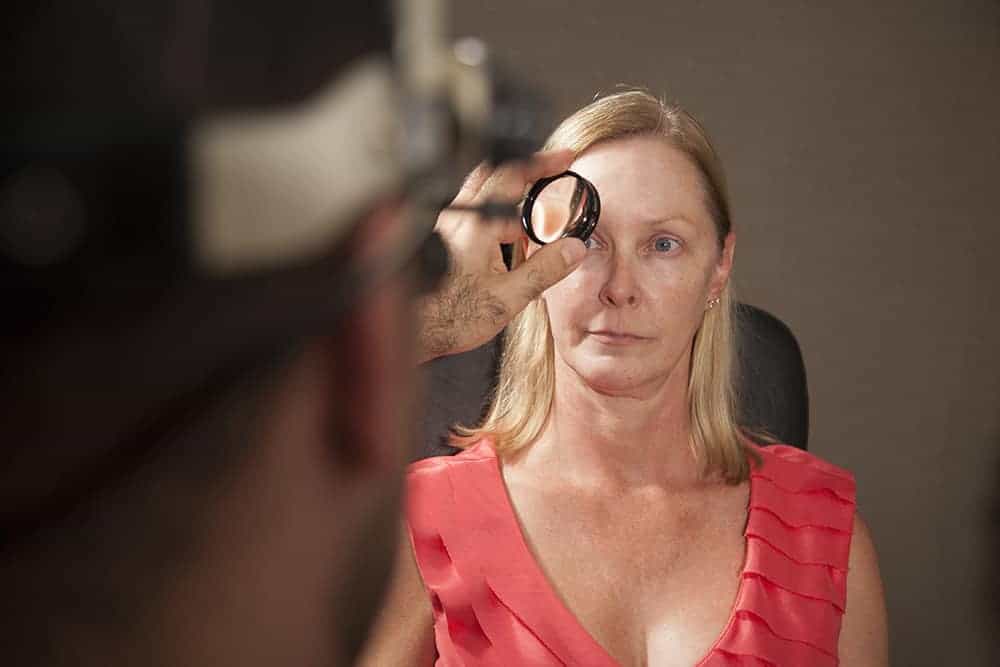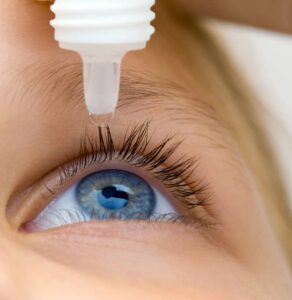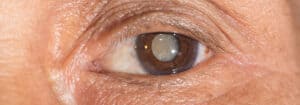What is the First Sign of Cataracts?

Cataracts cause serious issues with your vision. Some symptoms of cataracts are:
- blurry vision
- increased sensitivity to light
- poor and worsening vision at night
- seeing halos and glares
- double vision
- rapidly changing prescription
- faded colors
Half of all Americans will develop cataracts by the age of 75. With a significant percent of the population affected by cataracts, it only makes sense to understand the warning signs.
What Does Vision Look Like With Cataracts?
Vision with cataracts is similar to peering through a fogged-up window. Those with cataracts report foggy, filmy, or cloudy vision. This is because the light isn’t able to pass through to the retina. Over time vision will worsen, with seeing at night becoming especially difficult.
Symptoms of Cataracts
Cataract symptoms are generally not painful. Symptoms can be as simple as poor night vision, sensitivity to light, or double vision. Color may begin to appear faded and many will begin to see ‘halos’ around light sources.
These symptoms are unlikely to set in at once. You may notice one or two of the symptoms associated with cataracts until cataracts worsen.
As cataracts progress your eye’s lens can begin to take on a yellow or brown discoloration. This can cause the world around you to appear aged and faded.
Causes of Cataracts
Cataracts will typically form as we get older, but age is not the only cause. Cataracts can be caused by medical conditions or can be present at birth.
Eye injuries present another opportunity for cataracts to form as the eye heals from the trauma.
Types of Cataracts
Types of Cataracts include:
- Age-related – form as we age.
- Congenital – typically associated with babies and children.
- Secondary – associated with medical conditions, toxic substances, and other harmful radiation.
- Traumatic – occur after an injury occurs to the eye.
Risk Factors
Certain age groups are more prone to cataracts and certain lifestyles pose greater risk factors. Exposure to ultraviolet light, smoking, and heavy drinking have all been linked to an increase in cataracts. Certain medications like corticosteroids and diuretics have also been shown to increase the risk of cataracts.
Cataract Prevention
Get More Vitamin C and Vitamin E
Consider incorporating foods high in antioxidants such as vitamins C and E into your diet, as they can be considered useful in the prevention of cataracts. They’ll also give you a boost to your overall health.
Wear Sunglasses
Protecting your eyes with sunglasses can also help to prevent cataracts. It will keep them protected throughout your day. This is especially important when you’re outside or in the sun for long periods of time.
When buying a pair of sunglasses to use, look for a pair that:
- Blocks out 99% to 100% of UVA and UVB rays
- Screens out the majority of visible light, preferably between 75% and 90%
- Fits the shape of your face to avoid discomfort and improve protection
Frequently Asked Questions
We’ve listed some of the most common cataract-related questions below. Get the answers that you need.
How Quickly Can Cataracts Develop?
A cataract’s growth can develop over the course of years when it comes to age-related cataracts. Or it could be much quicker when talking about medical cataracts from conditions like diabetes. Cataracts can even develop in both eyes at the same time and grow at different rates.
Address the growth of cataracts with your doctor to develop an individualized treatment plan.
Can You Feel a Cataract On Your Eye? 
Not entirely. Cataracts are not typically considered painful, and in early stages may only be a nuisance when it comes to everyday life. Cataracts are typically only noticeable due to their effects on the vision, which over time can lead to negative side effects on the eye if left untreated. However, it’s still best to treat cataracts sooner rather than later to protect the long term health of your eyes.
Can Stress Cause Cataracts?
Stress could play a possible role in the formation of cataracts. Those that are under constant stress lead the body to create more oxidative stress, which can destroy the enzymes and proteins in the lens. This in turn can lead to an increase in the chances of cataracts developing.
How Bad Do Cataracts Have to Be to Qualify for Surgery?
Cataract surgery is dependent on the person. Cataracts are not life-threatening but can become a problem in your day-to-day life as they progress. If you have any other eye condition, like age-related macular degeneration, your ophthalmologist may take a more aggressive approach to treatment.
Because every patient is unique, being seen by an ophthalmologist will help you to develop a treatment program designed specifically for your eyes.
What Will Happen If a Cataract is Left Untreated?
While cataracts are not life-threatening, it can interfere with daily activities such as driving or even walking down the stairs. Lack of treatment can also lead to problems with treating other eye-related conditions.
At What Stage Should Cataracts Be Removed?
The only cure for cataracts is surgical removal. But, deciding the best time for the surgical removal of cataracts is up to the patient’s ophthalmologist. Many factors are considered in order to decide the best time for surgery but once cataracts are negatively affecting the everyday lifestyle of the patient most ophthalmologists will move forward with the surgical removal process.
While both eyes can have cataracts, cataract surgery is not usually performed in both eyes at once. This is due to potential complications affecting both eyes at once.
Getting Help for Your Cataracts
Having your cataracts monitored and eventually removed by an ophthalmologist will ensure your vision is maintained and long-term side effects are controlled or prevented entirely. Contact your ophthalmologist immediately if you suspect you may be developing cataracts. The earlier you get diagnosed the sooner you can begin treatment.
Catalaze Cataract Surgery™
Safely remove clouded cataracts and experience clearer, sharper vision with a premium lens implant. Dr. Tres wants to return your eyesight with the new CataLaze™ system.





